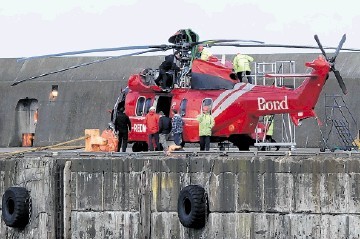
The owner of a helicopter which ditched in the North Sea last week has grounded its entire Aberdeen fleet after an early investigation revealed a crack in the gearbox.
Bond Offshore Helicopters said it was extending its suspension of Eurocopter Super Puma helicopters from the EC225 model, which had to make an emergency landing in the North Sea on Thursday, to also include the AS332L2.
The move comes after an initial Air Accidents Investigation Branch (AAIB) examination of the Super Puma showed it suffered a crack to a gearbox shaft – something the company claims could not have been picked up through routine maintenance checks, as it was likely to have occurred during flight.
A Bond spokesman said yesterday: “In the light of the AAIB interim service bulletin, Bond Offshore Helicopters Ltd will continue the flight suspension of the EC225 and now, in addition, the AS332L2 helicopter.
“Bond Offshore Helicopters Ltd is working with Eurocopter as a matter of priority in finding a solution that will enable the helicopters to be returned to service.”
Last night bosses at CHC Helicopter said they had carried out inspections on their fleet after Thursday’s incident and confirmed none of their aircraft had been affected.
CHC Helicopter operates five EC225s out of Aberdeen and ten AS332L2s.
Nick Mair, regional vice-president at CHC Helicopter, said: “We do not compromise on safety and work closely with the relevant authorities, including the aircraft manufacturers, to ensure the high standards that we and our customers demand are delivered at all times.
“Additional precautionary engineering inspections on our EC225 and AS332L2 aircraft have confirmed that we have no aircraft affected and our Super Puma fleet remains fully airworthy. All operations will continue as normal in compliance with the manufacturer’s guidance and our maintenance programme.”
A gearbox failure was responsible for the downing of an AS332L2 Super Puma helicopter flying to Aberdeen from the Miller platform in the North Sea in April 2009, causing the deaths of 14 offshore workers and two crewmen.
In a report into the crash, the AAIB said the gearbox of the Eurocopter had suffered a “catastrophic failure” before it crashed into the sea.
Bond, which suspended all EC225 flights last week while it investigates what happened, said the AAIB analysis of last week’s incident matched its own.
The AAIB report into the latest incident says: “The crew of the helicopter carried out a controlled ditching following indications of a failure of the main gearbox (MGB) lubrication system and a warning of failure of the emergency lubrication system.
“The investigation has identified a 360° circumferential crack in the bevel gear vertical shaft in the main gearbox, in the vicinity of a manufacturing weld, causing disengagement of the drive to both mechanical oil pumps.”
In total Bond has grounded 11 helicopters. Five EC225s were taken out of operation immediately and, in light of yesterday’s AAIB report, the company has also grounded its four AS332L2s and the two jigsaw search and rescue helicopters, which are also AS332L2 model.
The operator has a further seven helicopters – three AW139s and four ECAS365N3s – which do not operate out of Aberdeen. They have not been grounded.
On Thursday a major rescue operation was launched after the £17.6million Super Puma landed in the North Sea after an oil pressure warning light came on. The three-year-old EC225 aircraft was carrying two crew and 12 offshore workers and came down 25miles east of Aberdeen shortly after noon.
The men were all rescued and the pilots have been hailed as heroes for completing a tricky sea landing and saving the lives of everyone on board.
It was the third serious incident involving a Bond Super Puma in the North Sea in the last three years.
Bill Munro, the firm’s managing director, added: “The skill and training of Bond’s pilots has been witnessed at first hand. Our passengers can be confident in Bond as the principal crew change operator in the North Sea.”
Kevin Stewart, SNP MSP for Aberdeen Central, said: “These helicopters are used on a daily basis by offshore workers and I welcome the speed at which the AAIB and Bond Offshore Helicopters have acted.”
Bob Crow, general secretary of the RMT union, said: “We are deeply concerned at these revelations which back evidence from our members of mechanical problems with the Bond fleet that do not appear to have been investigated in recent weeks. We welcome the prompt work of the AAIB and we need the involvement and sign-off from all sections of the offshore industry to steer us through this safety crisis.”